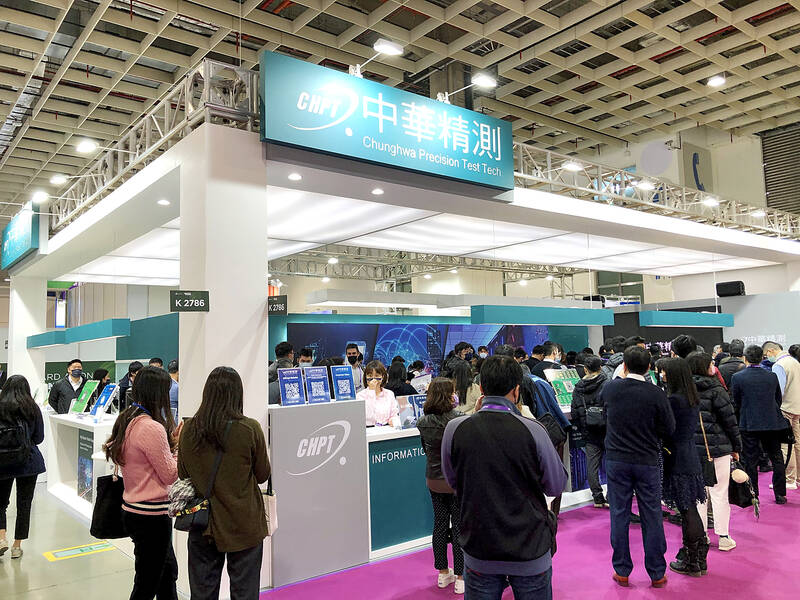Chunghwa Precision Test Technology Co (CHPT, 中華精測), a chip testing and wafer probing services provider, yesterday said the effect of Washington’s potential tariff hikes would be minimal as only a small portion of its products would ship directly to the US.
The company in 2022 upgraded its unit in San Jose, California, into a subsidiary and quadrupled capacity at a factory there to cope with customers’ demand for testing artificial intelligence (AI) chips and smartphone processors, CHPT president Scott Huang (黃水可) said.
“Only a small fraction of our shipments go directly to the US. A majority of our testing capacity is in Taiwan,” Huang said, adding that most chips made in Taiwan are usually assembled with hardware and then shipped to destinations worldwide.

Photo: CNA
The company expects North America, which houses the world’s major AI chip suppliers such as Nvidia Corp, to be a rapidly growing market, thanks to the AI boom, Huang said.
To better serve its customers there, the company’s board of directors on Tuesday approved a plan to provide its North American team with more power and financial resources, he said.
North America last year replaced Taiwan as the biggest revenue source for the company, making up about 60 percent of its total revenue compared with 30 percent in 2023, while China only accounted for 10 percent, he said.
CHPT is positive about this year, given the robust testing solutions business, including testing of advanced load boards and probe cards amid strong demand for high-performance computing and AI applications, Huang said.
The company expects “better-than-seasonal” performance during the first two quarters with an annual growth in revenue, extending the strong momentum from the final quarter of last year, he said.
The first two quarters of a year are usually the slack season for the electronics industry, he said.
Huang said CHPT employees had to work overtime during the nine-day Lunar New Year holiday to meet customer demand.
“Our factory utilization continues to be at a high level, approaching full capacity,” he said. “The equipment utilization for load boards would be full until April.”
“The first quarter is likely to be the strongest first quarter in the company’s history,” he added.
CHPT supplies advanced load boards used to test advanced wafers, which Taiwan Semiconductor Manufacturing Co (台積電) makes for Nvidia and other companies.
Net profit last quarter surged to an all-time high of NT$322 million (US$9.8 million), compared with NT$17.47 billion a year earlier, while on a quarterly basis, net profit doubled from NT$107 million, the company said.
Earnings per share (EPS) rose to NT$9.83 last quarter from NT$0.53 a year earlier and NT$3.25 a quarter earlier.
For the whole of last year, net profit soared to NT$510 million from NT$32.6 million in 2023, while EPS rose to NT$15.55 from NT$0.99.
The board of directors has approved a proposal to distribute a cash dividend of NT$7.8 per share, representing an about 50.16 percent payout ratio, the company said.

Three experts in the high technology industry have said that US President Donald Trump’s pledge to impose higher tariffs on Taiwanese semiconductors is part of an effort to force Taiwan Semiconductor Manufacturing Co (TSMC, 台積電) to the negotiating table. In a speech to Republicans on Jan. 27, Trump said he intends to impose tariffs on Taiwan to bring chip production to the US. “The incentive is going to be they’re not going to want to pay a 25, 50 or even a 100 percent tax,” he said. Darson Chiu (邱達生), an economics professor at Taichung-based Tunghai University and director-general of

‘LEGACY CHIPS’: Chinese companies have dramatically increased mature chip production capacity, but the West’s drive for secure supply chains offers a lifeline for Taiwan When Powerchip Technology Corp (力晶科技) entered a deal with the eastern Chinese city of Hefei in 2015 to set up a new chip foundry, it hoped the move would help provide better access to the promising Chinese market. However, nine years later, that Chinese foundry, Nexchip Semiconductor Corp (合晶集成), has become one of its biggest rivals in the legacy chip space, leveraging steep discounts after Beijing’s localization call forced Powerchip to give up the once-lucrative business making integrated circuits for Chinese flat panels. Nexchip is among Chinese foundries quickly winning market share in the crucial US$56.3 billion industry of so-called legacy

Hon Hai Precision Industry Co (鴻海精密) is reportedly making another pass at Nissan Motor Co, as the Japanese automaker's tie-up with Honda Motor Co falls apart. Nissan shares rose as much as 6 percent after Taiwan’s Central News Agency reported that Hon Hai chairman Young Liu (劉揚偉) instructed former Nissan executive Jun Seki to connect with French carmaker Renault SA, which holds about 36 percent of Nissan’s stock. Hon Hai, the Taiwanese iPhone-maker also known as Foxconn Technology Group (富士康科技集團), was exploring an investment or buyout of Nissan last year, but backed off in December after the Japanese carmaker penned a deal

WASHINGTON POLICY: Tariffs of 10 percent or more and other new costs are tipped to hit shipments of small parcels, cutting export growth by 1.3 percentage points The decision by US President Donald Trump to ban Chinese companies from using a US tariff loophole would hit tens of billions of dollars of trade and reduce China’s economic growth this year, according to new estimates by economists at Nomura Holdings Inc. According to Nomura’s estimates, last year companies such as Shein (希音) and PDD Holdings Inc’s (拼多多控股) Temu shipped US$46 billion of small parcels to the US to take advantage of the rule that allows items with a declared value under US$800 to enter the US tariff-free. Tariffs of 10 percent or more and other new costs would slash such